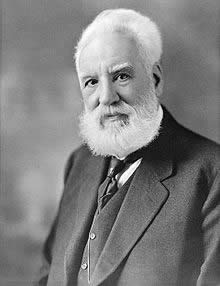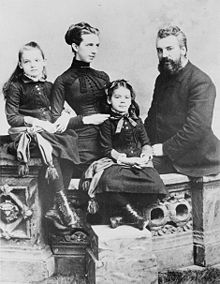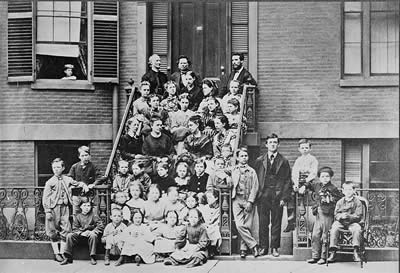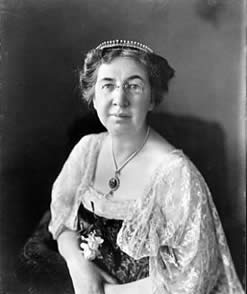The circumstances are leading us towards a specific mission in life
 Alexander Graham Bell.
Alexander Graham Bell.
Alexander Graham Bell was deeply affected by his mother's gradual deafness, (she began to lose her hearing when he was 12) and learned a manual finger language so he could sit at her side and tap out silently the conversations swirling around the family parlour. He also developed a technique of speaking in clear, modulated tones directly into his mother's forehead wherein she would hear him with reasonable clarity. Bell's preoccupation with his mother's deafness led him to study Acoustics (study of all mechanical waves in gases, liquids, and solids including vibration, sound, ultrasound and infrasound).
In October 1872 Alexander Graham Bell opened a school in Boston named the "Vocal Physiology and Mechanics of Speech" which attracted a large number of deaf pupils. Working as a private tutor, one of his most famous pupils was Helen Keller, who came to him as a young child, unable to see, hear, or speak. She later was to say that Bell dedicated his life to the penetration of that "inhuman silence which separates and estranges."
 Alexander Graham Bell, his wife Mabel Gardiner Hubbard, and their daughters Elsie (left) and Marian, 1885.
Alexander Graham Bell, his wife Mabel Gardiner Hubbard, and their daughters Elsie (left) and Marian, 1885.
. Several influential people of the time, including Bell, viewed deafness as something that ought to be eradicated, and also believed that with resources and effort they could teach the deaf to speak and avoid the use of sign language, thus enabling their integration within the wider society from which many were often being excluded. However in several schools children were mistreated, for example by having their hands tied behind their backs so they could not communicate by signing—the only language they knew—in order to force them to attempt oral communication.
While days and evenings were occupied by his teaching and private classes, Bell began to stay awake late into the night, running experiment after experiment in rented facilities at his boarding house. Keeping up "night owl" hours, he worried that his work would be discovered and took great pains to lock up his notebooks and laboratory equipment. His health deteriorated as he suffered severe headaches. Returning to Boston in fall 1873, Bell made a fateful decision to concentrate on his experiments in sound.
Deciding to give up his lucrative private Boston practice, Bell only retained two students, six-year old "Georgie" Sanders, deaf from birth and 15-year old Mabel Hubbard. Each pupil would serve to play an important role in the next developments. George's father, Thomas Sanders, a wealthy businessman, offered Bell a place to stay with Georgie's grandmother, complete with a room to "experiment".
 Bell, top right, providing pedagogical instruction at the Boston School for Deaf Mutes, 1871. Throughout his life he referred to himself as "a teacher of the deaf"
Bell, top right, providing pedagogical instruction at the Boston School for Deaf Mutes, 1871. Throughout his life he referred to himself as "a teacher of the deaf"
Mabel was a bright, attractive girl who was ten years his junior but became the object of Bell's affection. Losing her hearing after a bout of scarlet fever at age five, she had learned to read lips but her father, Gardiner Greene Hubbard, Bell's benefactor and personal friend, wanted her to work directly with her teacher.
Later, Alexander Graham Bell invented the first practical telephone.
Mabel was the indirect source of her husband's early commercial success after his creation of the telephone. The U.S. Centennial Exposition in Philadelphia in 1876 made Bell's newly invented telephone a featured headline worldwide. Ironically, Bell, who was then a full-time teacher, hadn't even planned on exhibiting at the fair due to his heavy teaching schedule and preparation for his student's examinations. He went there only at the stern insistence of Mabel, his then-fiancée and future wife. Mabel had understood Bell's reluctance to go to the exhibition and display his works, so she secretly bought his train ticket to Philadelphia, packed his bag, and then took the unknowing Bell to Boston's train station where she told her shocked fiancé that he was going on a trip. When Bell started to argue, Mabel turned her sight away from him, thus becoming literally deaf to his protests.
On 11 July 1877, a few days after the Bell Telephone Company was established, Bell married Mabel Hubbard at the Hubbard estate in Cambridge, and shortly thereafter, embarked on a year-long honeymoon in Europe. Although the courtship had begun years earlier, Alexander waited until he was financially secure before marrying. They had four children of which two sons died shortly after birth.
 Mabel Gardiner Hubbard (c.1917), who became completely deaf at age five.
Mabel Gardiner Hubbard (c.1917), who became completely deaf at age five.
Bell died of complications arising from diabetes on August 2, 1922, at his private estate, at age 75. His end came at 2:00 am... His wife, Mabel, daughter Daisy, and son-in-law had gathered around him. His last view was of the moon rising above the mountain he loved. While tending to her husband after his long illness, Mabel whispered, "Don't leave me." By way of reply, Bell traced the sign for no—and then he expired.
After Alec's death in 1922, Mabel slowly lost her sight and grew increasingly consigned to the care of her daughters, withdrawing into a world of silent darkness. She died of pancreatic cancer at the home of her daughter, less than a year after her husband. Her ashes were interred with Alexander's grave exactly one year, to the hour, after his burial. Today, they rest together near the top of their "beautiful mountain" of their estate, under a simple boulder of granite.
Bell was deeply affected by his mother's gradual deafness. Bell's preoccupation with his mother's deafness led him to study Acoustics. He opened a school for deaf pupils and he referred to himself as "a teacher of the deaf". Naturally he gets attracted towards a deaf girl and he married her. The circumstances led him to study sound and in turn he invented practical telephone. He rose above bad circumstances. The circumstances are leading us towards a specific mission in life. Whether we understand it and respond positively determine our success in life.